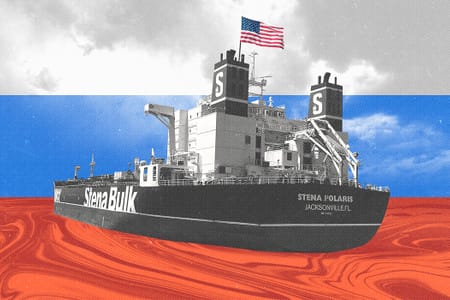The Pentagon Is Buying Fuel Made with Russian Oil

How the Pentagon ended up buying fuel made with Russian oil, despite the myriad bans in place

Delivered to our subscribers on Thursdays, the new version of The Bridge is an email exclusive product that wades through the jargon of our government and gets straight to the key insights. Sign up here.
On February 24, 2022, Russia invaded Ukraine. Twelve days later, President Joe Biden signed an executive order banning the import of Russian oil — Russia’s most lucrative export — to the United States. By February 2023, in lockstep with the European Union, the U.S. had put price caps on Russian petroleum products and an embargo on seaborne Russian petroleum exports.
But despite the bans, price caps, and embargos in place, one notoriously negligent buyer slipped through the cracks and continued to purchase fuel made with Russian crude: the Pentagon. We published an investigation on this finding last month.
Russia’s war machine is largely funded by the sale of petroleum. By purchasing fuel made with Russian crude, the Department of Defense (DOD) is helping fund Russia’s war on Ukraine — with our tax dollars.
As our investigation found, at the same time our government is sending massive amounts of aid to Ukraine, it is also spending nearly a billion dollars on contracts that financially benefit Russia.
In the edition:
In early December, in a rare example of bipartisanship, Senators Maggie Hassan (D-NH) and Marco Rubio (R-FL) sent a letter to Secretary of Defense Lloyd J. Austin demanding answers to how Russian oil ended up in the Pentagon’s supply chain and how the Pentagon plans to remedy the situation. POGO’s investigation was cited in the letter. With a spotlight on the findings, I spoke to the author and chief investigator behind the piece, POGO’s Jason Paladino, to understand more.
Russian oil seems to be flowing into the Pentagon’s supply chain by way of the Greek oil refinery Motor Oil Hellas, a giant in the industry with known connections to Russian firms and even Kremlin-controlled companies. The Pentagon has been working with Motor Oil Hellas for decades: Since 2004, it has spent over $5 billion on contracts with the refinery.
But there was a notable increase in 2022, after Russia’s invasion: In the 22 months since, DOD contracts with Motor Oil Hellas have totaled nearly a billion dollars. “It’s a huge spike,” Jason said, noting that the value of the new contracts surpasses totals from previous years.
But why the suspiciously timed spike? Jason says we only have theories. It could be because the U.S. itself started engaging in more military activity after Russia’s invasion of Ukraine, and that military activity created the need for more fuel. Jason notes in the investigation that it is likely the U.S. and NATO have been fueling their planes and boats with partially Russian-derived products since the invasion in 2022.
Contracts to address this spike in demand could have been threatened by the EU and U.S. embargo on seaborne imports and price caps on Russian oil in December 2022, but a possible “oil laundering” scheme may have emerged as a workaround.
In his investigation, Jason explains how oil that was being exported directly from Russia to Greece is now seemingly being rerouted through Turkey. There are a series of fascinating data visualizations in the investigation that depict the sharp decline of Russian oil imports and the subsequent uptick in Turkish oil imports to Motor Oil Hellas. I highly recommend you check them out. They paint a clear picture of the mechanics of this workaround that’s moving oil from Russia to Turkey to Greece, and then to the Pentagon.
An intercontinental web like this one is extremely complicated to trace. As Jason notes in the investigation, the globalized nature of the oil industry makes it difficult to know the true origin of any gallon of fuel, or to say which companies or countries were involved at any given point in the supply chain.
It follows then that any bans, embargoes, or price caps would be equally complicated to enforce. According to Jason, there aren’t really any oversight or enforcement mechanisms in place to support the sanctions regime.
And when it comes to the Pentagon’s responsibility to police their own supply chain, “There’s nothing clear in the books right now that would prevent things like this from happening,” he told me.
Jason explained that DOD is required to do very little other than check to see whether the companies they’re contracting with are on the sanctions list. Motor Oil Hellas is not. It is clear as day, however, that due diligence needs to go far beyond that in a system as complex as the one the Pentagon is involved in.
“The onus is on the DOD to ensure that the products they’re buying aren’t originating in Russia and inadvertently helping fuel Putin’s invasion, especially because the export of oil is a major revenue source for Russia,” Jason explained. “If you look at their budget, it is how they can keep this war going.”
This isn’t the first time the Pentagon’s overly complex and unruly supply chains have landed them in hot water. Last year, the Pentagon had to pause shipments on a delivery of F-35 fighter jets after they realized a Chinese-made alloy had ended up in a component.
“This is a story that asks the question of whether the Pentagon knows what they’re buying,” Jason said.
Origins can be challenging to trace in a globalized economy, and especially so given how the Pentagon operates. But vigilance and oversight are crucial, especially when the stakes are so high. Our nation can’t keep unwittingly funding an invasion it so staunchly opposes.



Sent Saturdays
